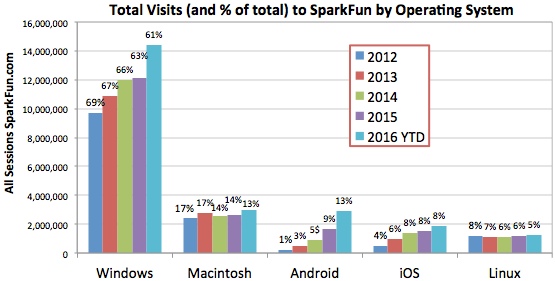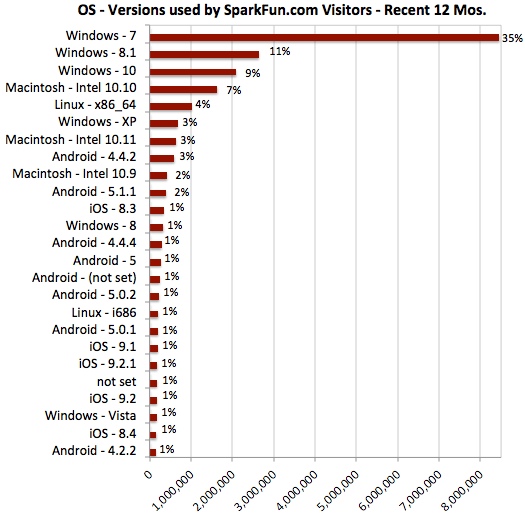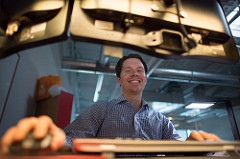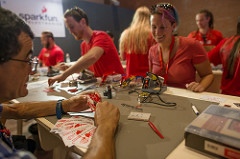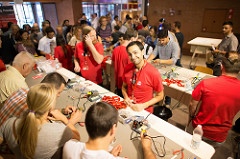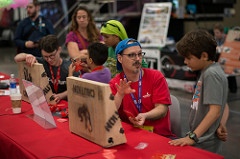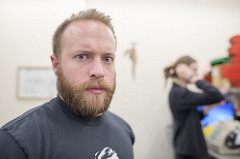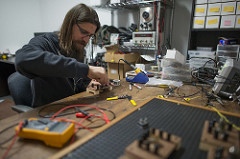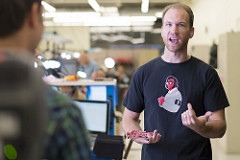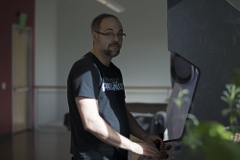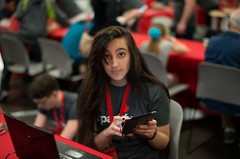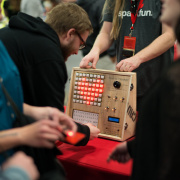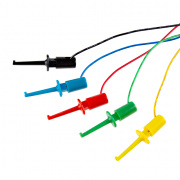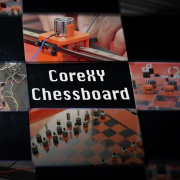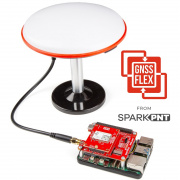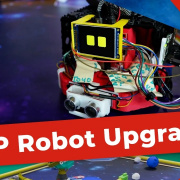What Operating System(s) do you use?
Let's take a look at which OS(s) our engineers and customers prefer.
The dominance of the Windows Operating System (OS) among visits to SparkFun.com has been shrinking from 70% five years ago to 60% this year. Obviously, Windows is still the predominant OS and visits using Windows grew 18% in the recent year, but all visits grew substantially. So which OS took share from Windows?
Android.
Visits using the Android OS grew the most (70% year over year), followed by iOS (20%), Windows (18%), Macintosh (10%) and Linux (3%).
In step with the rapid growth of the Android OS is the growth of all mobile (phone or tablet) visits to SparkFun (72% YOY). The most common operating systems in use from mobile devices include Android (61%), followed by iOS (36%), Windows (1%), and Blackberry (0.5%).
As I started looking into trends in Operating System use, I ran into Nate, so I asked him what OS he uses here at work. He replied, "Windows 7."
Windows 7?!
I decided to do an unofficial survey of SparkFun engineers: “What OS do you use here at work?” and “What OS(s) do you think are best for hobbyists working embedded electronics?” *Note: the way I worded these questions means I did not get any information on OSs used on their mobile devices (Android).
Half of SparkFun’s engineers (and Creative Techs) use more than one Operating System at work, and almost all of them use Windows at least part of the time.
- 93% Windows (12 out of 13 Engineers use Windows at least sometimes at work; six of them use Windows 7)
- 43% Linux
- 36% OSX/Mac
SparkFun engineers and our audience use Windows OS more than the global population according to SitePoint. And our community uses Linux at five times the average rate.
Why?
Here is where I handed it off to SparkFun engineers.
What operating system do you use here at work?
All of them! I use the three major, modern operating systems: Windows, OS X, and Linux.
What operating system(s) do you think is the best for hobbyists working with embedded electronics? Why?
Most software tools one needs as an electronics hobbyist can be managed using all the major operating systems. For example, EAGLE, Arduino, and Blender have installers for Windows, OS X, and Linux. However, many professional-grade tools, such as Atmel Studio, MPLAB, PSoC Creator, Altium Designer, and Solid Works are Windows-only. If you want to be a hobbyist, any OS will work just fine. If you are planning to join a company as an engineer, you will likely be required to use a more powerful tool, and many of them are strictly Windows.
What operating system do you use here at work?
I use Windows 7 on my desktop, and Ubuntu 15.04 on my laptop for work. I like having two different ones because it gives me the option to test things out on two different operating systems and make sure everything works well. I'd personally run some version of Linux on both if I could, but since a lot of our customers and tech support are on Windows, I need to be able to help them debug.
What operating system(s) do you think is the best for hobbyists working with embedded electronics? Why?
I think in a lot of ways, open source systems like Linux distros are great because they give the users a lot of freedom for customization and configuration (and also, open source!). Unfortunately, there's still a lot of software out there that isn't compatible on Linux, so Windows and Mac are more supported. End of the day though, I think whatever operating system a hobbyist is most comfortable with is the best one for them to work on embedded electronics - that way they can spend their time really focusing on learning and debugging the electronics, instead of getting bogged down in operating system nonsense.
What operating system do you use here at work?
I switch between a Windows 10 PC and a Macbook running Mac OS X 10.11.3 at work. It can be a hassle to get some toolchains working on a Windows machine, but it's an OS I feel very comfortable using. Plus, there are a few programs I use that only work in a Windows environment, like Atmel Studio and PSoC Creator. I go back-and-forth between that and the Mac, which runs 90 percent of the applications I need for work (Eagle and Arduino specifically). The Mac gives me a UNIX terminal, which is handy. Plus, I think OS X’s extra UI polish just subconsciously makes me a little happier.
What operating system(s) do you think is the best for hobbyists working with embedded electronics? Why?
I think a hobbyist can easily get by on Mac, Windows, or any flavor of Linux - there are plenty of CAD, EDA, and software-developing options out there (many even support all three). If anything, I think it's important to be familiar with all major OS's. If you're developing a new product, you'll be better able to support or debug it on any machine.
What operating system do you use here at work?
Win 7 Pro. It's what works. Less maintenance than Linux of any flavor, but I'm down on neck-beard cred as a result. Meh. I got a job to do.
What operating system(s) do you think is the best for hobbyists working with embedded electronics? Why?
Jeez, you're going to start a flame war with that. But as far as OS's go, most of our suppliers write stuff that's supported by Windows because that's what's most prevalent. If you want to work less on your PC and more on your project, you're probably better off with a Windows machine. If you want complete control over everything in your domain (and all the headaches that go along with that), try out one of the zillions of Linux distros. That's my take.
What operating system do you use here at work?
Windows (7, specifically), because it's what most of our customers use, so we develop in the same environment as the user.
What operating system(s) do you think is the best for hobbyists working with embedded electronics? Why?
Depends on your definition of “embedded electronics.” If you’re an engineer developing with AVRs, ARMs, etc, you probably want Windows, because those companies and third-party companies create IDEs and tools specifically for Windows. They want to use closed-source IDEs so they can sell and support them, but don’t want to jump through the driver hoops that Apple forces on you. If by “embedded electronics” you mean “Arduino,” operating system doesn’t matter, because the Arduino IDE was written in Java, which is platform-agnostic and will run on anything that will run Java. If by “embedded electronics” you mean “programming on a Raspberry Pi,” then Linux, because RPi’s run Linux.
What operating system do you use here at work?
I use Windows 7 on my work and home PCs. My mobile computer uses Windows 8.0. I use Windows because it is cheaper to buy a computer with, and because Linux doesn't work well for general computing -- I feel it works well when building a computer for a specific task (like creating a audio editing workstation/POS system, etc.).
What operating system(s) do you think is the best for hobbyists working with embedded electronics? Why?
I would recommend hobbyists list out the software they wish to run, and buy a machine that fits their needs. I find the Linux solutions attractive, but there's always some program Linux can't run, which necessitates windows or OS X. I would recommend what's easy for them to use.
What operating system do you use here at work?
Windows 7 Professional (heading towards Windows 10), because I never learned Linux. I know, I know. I'm a bit addicted to the Windows GUI and toolchain. It's like a warm blanket you had growing up as a kid – so hard to give away.
What operating system(s) do you think is the best for hobbyists working with embedded electronics? Why?
Hard to say. I still hear reports that Linux is better but not great for hobbyists (with regards to driver and software support for our various tool chains like JTAG programmers and IDEs). I think the most important thing for hobbyists is to constantly learn something new. For me, I know I need to round out my proficiency with Mac and Linux. Each has their strengths.
What operating system do you use here at work?
I spend 98 percent of my time in the current version of OS X (10.11.4 El Capitan). I also have Windows 10 in a virtual machine on my laptop. I have Windows 7 and the latest version of Ubuntu (free, open source OS) on my work desktop, but it is too slow so I rarely use it. I have mostly learned all of the GNU (free SW mass collaboration project) tools that come with POSIX systems like UNIX, BSD, GNU/Linux, and OS X. I like being able to write custom functions for common tasks (shell scripts and related stuff). You can run all of this as an add-on in Windows using packages like Cygwin or MinGW, but last time I tried the user experience wasn’t as good. I could also learn PowerShell, but Windows is not as common as POSIX compliant OSs in embedded systems. I always keep Windows around so I can run a handful of Windows-only applications.
What operating system(s) do you think is the best for hobbyists working with embedded electronics? Why?
With more and more of the things I do being in the cloud/browser, the actual OS matters less and less. I used a Chromebook when I started here, but the one I had couldn’t run EAGLE because it ran an ARM processor.
What operating system do you use here at work?
I use OS X 10.7.
What operating system(s) do you think is the best for hobbyists working with embedded electronics?
Whichever OS you are most well versed in. These days toolchains MUST be cross-platform to be worth using. If you’re forced to learn another OS just so you can run a program or program a board, then you should be using another program. Electronics can be incredibly frustrating, working with them on an OS you’re uncomfortable with just makes things worse.
What operating system do you use here at work?
I use Windows 7 at work because it was the last Windows OS that was reasonably easy to use unsigned drivers on. It’s also really stable, widely well supported by programs and drivers, and the UI is comfortably familiar to anyone who’s used Windows for ages, like I have.
What operating system(s) do you think is the best for hobbyists working with embedded electronics?
There are applications that I use that don’t run on any OS other than Windows; that makes trying to use another OS painful (I could run in a virtual machine, but that tends to make hardware stuff trickier and causes a performance hit; dual booting is also an option but in my experience, a dual boot machine gets used in one OS all the time anyway).
It’s an unpopular opinion, but I see no reason other than bragging rights to use an OS other than Windows for most people. HOWEVER, I do make heavy use of a program called Cygwin, which basically gives you a command line equivalent to Linux under Windows. I find the Linux command line to be much more pleasant to work under than Windows, and Cygwin gives me just enough of that to satisfy my needs.
In other words, it’s easier for me to get my Windows machine to behave enough like Linux for my comfort than it would be to get a Linux machine, or Mac, to behave enough like Windows.
There are other engineers in the department that use Macs, and a couple that use Linux at least part time. For simplicity’s sake, though, I stick with Windows.
What operating system do you use here at work?
I use Windows because I feel like it is easier to access all my files, and all the programs I need to use can easily run on Windows
What operating system(s) do you think is the best for hobbyists working with embedded electronics?
For me, Windows is the best operating system, since some programs I have to run on Windows for Mac (just recently the SewArt program for changing .jpeg images into .pes images for the embroidery machine, also SolidWorks and 3D imaging programs). I just think it's better not to have to deal with that.
In Summary
It was interesting to find that there is not an operating system monopoly here at SparkFun - nor at large (like there used to be). And it was good to know that a number of my coworkers use multiple systems in a day - some of them open source. As it turns out, there are good reasons why the majority of engineers run Windows, and the majority of SparkFun's programmers and creative types (including myself) prefer to run OS X at work. It seems to come down to the types of programs available and one's level of familiarity with the OS. Preconceived notions and brand loyalties didn't come into play as much as I thought.
What is your preferred OS? Why?
